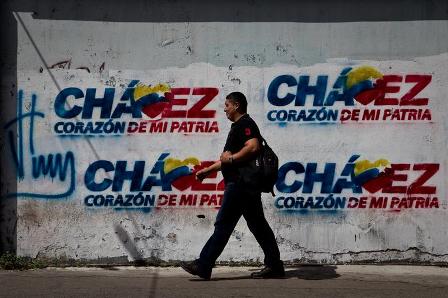
Two months after winning elections for his third term, on December 8, 2012, President Hugo Chávez broadcast a nationwide speech, which would be his last address to the nation. “It is absolutely necessary, it is absolutely essential for me to undergo further surgery. And this must happen in the coming days,” said Chávez, to justify his trip to Cuba, where he had the surgery.
“I have to return to Havana tomorrow, so I have here the letter of request to the National Assembly, its president, brother Diosdado Cabello, I will sign at once, so the sovereign National Assembly may authorise my absence – it is all explained here – so I can have another surgery,” explained the Head of State.
Chávez’s absence marked the beginning of a countdown of sorts. In theory, Article 231 imposed the date by which the patient should return. “The elected candidate shall take office as President of the Republic on January 10 of the first year of his or her constitutional term, taking an oath before the National Assembly. If for any reason the President of the Republic is unable to take the oath before the National Assembly, he or she shall do so before the Supreme Court.” Consequently, Chávez had to be back by January 10, 2013, to be sworn in and start officially his fourth term in office.
The opacity in the handling of official information, rumours about the president’s health and the tensions in the national political debate, opened the discussion about the type of absence – temporary or absolute –, whether the head of the National Assembly should take the reins of the executive branch and about the legality of incumbent government.
On December 21, 2012, a lawyer requested the Constitutional Court to interpret the scope of Article 231. Among the questions asked to the Supreme Court, there was one that would have been impossible to imagine years ago: “Who takes the temporary office of the President of the Republic if the elected candidate does not attend the inauguration and is not sworn in on January 10?”
In a joint presentation, the judges cleared the doubts on January 9, 24 hours before the deadline set in the Constitution. “Although a new constitutional period begins on January 10, a new inauguration for President Hugo Chávez is not necessary, in his capacity as re-elected President, since there is no interruption in the performance of his duties,” they argued.
“The inauguration of a re-elected President may be held at a later time after January 10, 2013, before the Supreme Court, in case it cannot be held before the National Assembly in accordance with the provisions of Article 231 of the Constitution. This ceremony shall be determined by the Supreme Court, once there is evidence of the cessation of events that prevented the inauguration in the first place,” said the judges.
The Constitutional Court also endorsed the continuity of government. “The Executive Branch (composed of the President, the Vice President, Ministers and other bodies and officials of the Administration) shall continue to fully perform their duties based on the principle of administrative continuity,” the Court said. This reasoning of the Supreme Court allowed Nicolás Maduro to launch his campaign for the presidential elections of April 14, 2013, as Vice President.
In the end, the judges’ effort was to no avail. Hugo Chávez died on March 5, 2013. He could never take office. The Supreme Court judges can interpret the Constitution as they like, but they cannot repeal the laws of destiny”.
Extract of the judgment
failure to be sworn in before the National Assembly on January 10, does not imply this absence either, because the same provision establishes that said ceremony may take place before the Supreme Court, on a later date (…) failure to attend the scheduled inauguration on January 10, does not invalidate the current term (…) At this point, we should refer to «the principle of administrative continuity» as a concept that prevents the stoppage of the provision of public service (…) Regarding (…) the principle of continuity, in this case, it is unacceptable to assume that in case of a time lag between the start of the constitutional term (…) and the inauguration of the re-elected President, the government is considered nonexistent. It is inconceivable that the lack of a timely inauguration before the National Assembly results in a power vacuum in the Executive Branch each of their entities, especially if the Constitution itself permits such action to be deferred for a later date before the Supreme Court».